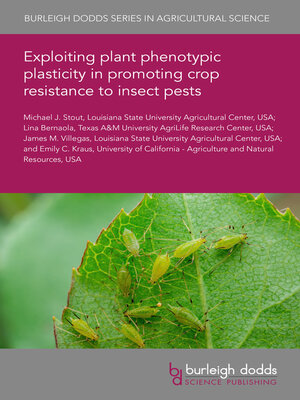Exploiting plant phenotypic plasticity in promoting crop resistance to insect pests
ebook ∣ Burleigh Dodds Series in Agricultural Science
By Professor Michael J. Stout

Sign up to save your library
With an OverDrive account, you can save your favorite libraries for at-a-glance information about availability. Find out more about OverDrive accounts.
Find this title in Libby, the library reading app by OverDrive.



Search for a digital library with this title
Title found at these libraries:
| Library Name | Distance |
|---|---|
| Loading... |
This chapter explores how an understanding of crop phenotypic plasticity might inform and improve pest management. In crops, plant-mediated interactions among herbivores and other organisms may have implications for pest management by, for example, altering thresholds or recommendations for scouting or management interventions; however, insufficient data exist to determine whether plant-mediated interactions are strong enough to warrant modifications to management practices. In addition, plasticity may enable stimulation of resistance in anticipation of herbivore attack through the application of substances that induce plant defense mechanisms, including chemical elicitors, soil microorganisms, and soil amendments. Greater understanding of the mechanisms by which these substances increase resistance and of the factors that influence their effectiveness will be needed to leverage phenotypic plasticity for improved pest management.







